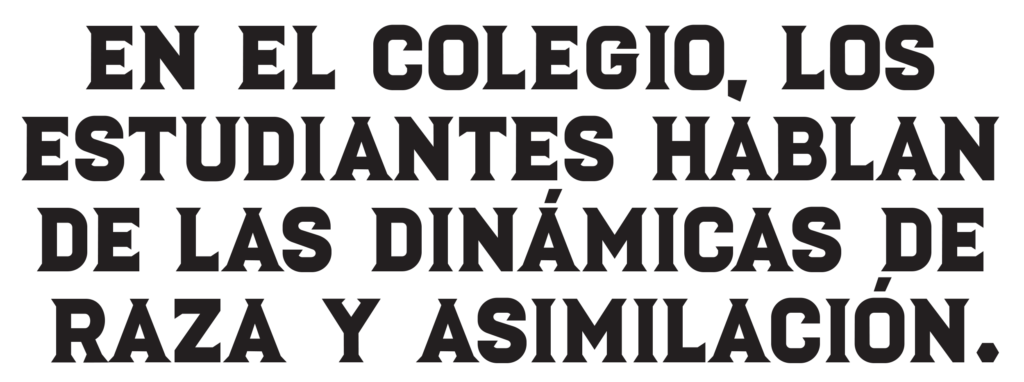

The Executive Director of El Colegio High School

Story by: Allison Herrera
Photography by: Emily Barrera
Illustration by: Luis Fitch

Norma Garcés tells the story of how her grandfather Pasqual managed to get a sewer line built in the town where she grew up—Tenancingo, Mexico.



Norma shares this story inside a classroom at El Colegio High School in South Minneapolis. A school she leads as executive director.
Tenancingo needed a sewer line and her grandfather had the unpopular task of asking everyone in town to hand over some money so the town could make it happen. Everyone needed to give money—including a single mom who made money begging on the streets, Norma recalls. It provoked an outcry. How could one of the most powerful men in the town possibly ask a woman so clearly disadvantaged to contribute money she didn’t have, might not ever have?
“I will go and talk to her,” Norma was told by her grandfather. Pasqual got money from the woman, and only seventy years later did Norma learn how.
“He gave her the money so she could give it to him.” Wiping away tears from her eyes, Norma recalls that story because it still strikes a nerve. “If she can give money, anyone can give money.” That was one lesson her grandfather wanted to impress on the town. But it wasn’t the only lesson.
“For my grandfather, it was also about the dignity of this woman. No one would ever look down on her.”

That story is something that Norma holds tight as she walks the halls, talks with students, parents and staff at El Colegio.


Like many of her students, Norma left Mexico for something better. But she’s quick to point out that in no way were her struggles like those of her students, who often take care of siblings, work, and try to keep their families intact. And as Latinx youth, they also are in a fight to keep their cultural identity and dignity, while navigating a school system that Norma says doesn’t want to deal with them. That’s a fight Norma understands.


Translation: And as Latinx youth, they also are in a fight to keep their cultural identity and dignity.



Norma has been the leader of El Colegio High School for nine years now. It’s a public charter school made up of nearly 100% Latinx and Indigenous youth. The school has been around since 2002, and for years it’s suffered from low enrollment and budget shortfalls. Midway through the 2018-2019 school year, there were 110 students enrolled—the most the school has ever had, but still 20 short of capacity.
El Colegio had a budget shortfall of $170,000 at the end of the 2017-2018 school year. Even though she says the school does have enough for the next year, Norma knows the seriousness of the situation. She and other leaders of the school are looking to raise funds from the community and other philanthropic sources. “It’s jarring to visit these sparkling foundation offices and make the case for El Colegio,” she says.
“Just seeing all the obvious wealth, when at my school we struggle to afford tape and scissors.”
El Colegio’s building—formerly a grocery store— is tucked away in a sleepy neighborhood in South Minneapolis on Bloomington Avenue. Today, the outside is painted bright orange and yellow, with murals of Cesar Chavez, Martin Luther King and Che Guevara painted on adjacent garage facades in the alley near the school.
Color and culture are also reflected inside. When you first walk through the double doors, the Popol Vuh poem Lak’ech is painted on the wall. In the cafeteria, rows of papel picados line the ceiling. Covers of banned books by Latinx authors like Sandra Cisneros cover the hallway walls. Norma explains that in 2010, when Arizona passed a law banning ethnic studies, which included the reading of such book titles as Bless Me Ultima by Rudolfo Anaya and The House on Mango Street by Sandra Cisneros. The students read them in protest of a now-overturned 2010 law in Arizona which banned ethnic studies.


At El Colegio, there is warmth and a sense of family. There is a palpable feeling of familiarity between the students and administrators. The students know each other, naturally, and Ms. Norma, as the students call her, knows all of them. She points to a student waiting near the reception desk. He attends El Colegio part time, after Norma discovered that he wasn’t going to school at all, and was at home alone most days as his mother worked. Another student, she said, bought him a coat even though she had very little herself.
At El Colegio, students talk about the dynamics of race and assimilation. To Norma, these discussions play an important role in helping students develop their identity and hold onto it with dignity. It’s like that piece of dignity she remembers her grandfather talking about when she was young.


Translation: At El Colegio, students talk about the dynamics of race and assimilation.
That sense of dignity and identity is something she held onto when she arrived in Taylor, Michigan in the mid-1980s to live with her mom, Carmen. Her parents had been divorced since she was six, and when her dad lost everything due to the Mexican banking crisis, Norma got on a plane and headed to the United States.
It was culture shock, to say the least. Her mom had gone from being a top salesperson for Ford in Mexico to working at a meatpacking plant and a restaurant. “I get there and my mom lives in a rundown apartment,” Norma remembers. It was above an old tv repair shop.
“We didn’t cross the river. We didn’t cross the desert. We walked in,” Norma says of her coming to the US. In other words, she didn’t experience the kind of immigration hardships that are making headlines these days. Still, that experience of being told you are undocumented was traumatizing, she says.
Norma’s mom told Norma and her sister not to leave the house, even to go to school. Why? Because they were undocumented and she feared they would be taken away. Norma and her sister couldn’t go to school, for fear that they would be caught up in a raid. “The moment you start working, you’re undocumented because you’re doing something illegal. And I didn’t leave when I supposed to leave.”


Translation: Norma and her sister couldn’t go to school, for fear that they would be caught up in a raid.
Norma stayed and worked with her mom at the restaurant, the two of them splitting $4.50 an hour washing dishes.
Until that point, Norma had no frame of reference for the concept of of oppression. She didn’t understand what it meant to wear the label of a “person of color.”
“I’m a minority? What is that?” she remembers thinking to herself. Even though Norma never considered herself a minority or a person of color when she lived in Mexico, it’s something she’s taken on — both officially, as part of the process of applying and eventually getting her papers to live permanently in the US — and willingly, because working with students at El Colegio demands an understanding of that identity.
Norma says this all while one of her students, Yajayra, sits nearby on a long conference room table.
Through tears, she brings the conversation back to dignity. This time, the dignity of her students. “This job is not just about me,” Norma offers. If she does well, the students do well.


Translation: “This job is not just about me.”
Fear of deportation and separation of families is a reality for many students who attend El Colegio. Even though Norma’s experience as an immigrant in this country is different, she’s using her story and her standing in the community a way to advocate for her students. In recent years, she’s had to lean on that advocacy in a big way.
“The day after Trump was elected, the whole school was just silent,” she remembers. Students were afraid. Norma rolled up her sleeves, though. “We’re going to be ok,” she told her students. “We just stick together and we make a plan.”


Translation: “We’re going to be ok,” she told her students. “We just stick together and we make a plan.”

She arranged for an immigration lawyer to come to the school to tell students their rights. She made sure families had a plan in case one or both parents were deported. They made sure copies of important documents were kept at the school and that students knew what to do.
Teachers now regularly patrol the school grounds before students are let out of school for the day just in case ICE might be parked nearby.
“We talked about what to do, and then we moved on. Keep your eyes on the prize.” Meaning, don’t let these things take away from your dreams or your dignity.
Making sure students graduate and consider college or post-secondary school is also part of that dignity.
“I ask some students, what do you want to be? Some say, ‘I want to be a mechanic’.” To which she typically responds: why just be the person fixing the cars? Why not own the shop? She conditions them to think bigger, to dream bigger.


Translation: “Why just be the person fixing the cars? Why not own the shop?”
“Being a mechanic is not building the cars, which is what they really want to do. So I say to them, ‘You want to be an engineer.’”
That’s why she says she’s in the business of hope. She helps students dream of—and work toward—a future where they can own the shop. A future where they can control their own destiny, with all the dignity that brings.

Donate to El Colegio to boost Latinx student graduations this academic year!



Contributors




